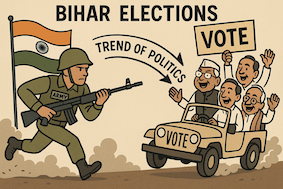Surjit Singh
With the Bihar Assembly elections just months away, Prime Minister Narendra Modi’s visit to the state on May 29 is being widely interpreted as an early campaign move. His speeches during this visit indicate that Operation Sindoor — a military response to a terror attack in Pahalgam — will likely be a central theme in the BJP’s electoral narrative, much like Balakot surgical strikes were during the 2019 Lok Sabha elections. Modi’s tone made it clear: the heroism of Indian soldiers is being politically positioned under his leadership, and that framing may well influence election outcomes.
Has politics always used the army’s actions?
This brings into question whether political mileage from military actions is a new phenomenon or one with deeper roots. A review of India’s military history over the last two decades shows that the Indian Army has conducted multiple cross-border operations, but not all were politicised.
Operation Ginger: 2011, Silent But Deadly
On August 30, 2011, Indian forces executed Operation Ginger, a retaliatory strike deep inside Pakistani territory after the brutal beheading of an Indian soldier. Led by then Major General S.K. Chakravarty (later Lieutenant General), Indian troops attacked three terrorist camps, killed several militants, and returned with three heads in exchange for one. The mission remained classified and unpublicised, its details emerging only much later through leaked documents.
Precision Strikes After Mumbai Attacks
Following the 2008 Mumbai terror attacks, Indian forces again crossed the Line of Control under operations known as Precision Strikes and Hot Pursuit. These were swift, targeted responses intended to dismantle militant infrastructure in Pakistan-occupied areas. The operations were successful, but again, not publicised.
2008 and 2013 Operations
Military documents confirm that in both 2008 and 2013, Indian soldiers carried out surgical actions across the LOC, neutralising terror camps. These missions mirrored later operations in their precision but were kept strictly confidential.
No Politics Then, Only Strategy
During these years, India was governed by the Congress-led UPA under Prime Minister Manmohan Singh. Despite significant military successes, the government chose not to broadcast these operations or leverage them politically. This discretion was seen as a form of strategic diplomacy — one that kept the army’s integrity distinct from electoral politics.







